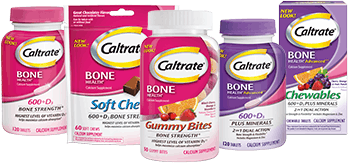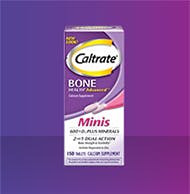THE STORY OF YOUR BONES: CALCIUM AT EVERY AGE
HOW MUCH CALCIUM DOES YOUR BODY NEED THROUGHOUT YOUR LIFE?
There’s no such thing as “too old” or “too young” for regular calcium intake. Since bones are a living part of your body, they need to be nourished every day to help support your body through all the stages of your life.*
No matter how many years ‘young’ you are today, calcium from Caltrate and a healthy, balanced diet can help support your bone health.*
Browse the categories below to see your calcium needs at each stage of life.
INFANT/TODDLER+
GROWTH SPURTS!
Growing (and learning) is a full-time job for infants and toddlers. They need the proper nutrients to help their bodies do just that.
- Fact: These are the prime years to set the stage for bone growth & development.
- Action Plan: Create a stimulating, active environment — holding, touching, face-to-face contact & hugs!
American Heart Association recommendation: Toddlers should get at least 30 minutes of structured physical activity daily to help build strength.
+ Caltrate is not formulated for use in children.
YOUTH+
TIME TO INVEST.
Did you know? 90% of teenage girls between the ages of 12 – 19 do not get enough calcium from diet alone.**
Just like saving for college from an early age, proper calcium is essential to prepare for healthy bones in later years.
- Fact: Maximizing bone mass early in life helps reduce bone loss and may reduce the risk of osteoporosis in later years.
- Action Plan: Sports, dance, summer camp—get them out and moving! Children & young adults age 9 – 18 need at least one hour of physical activity daily to stay healthy.
- Calcium Requirement: Boys & girls aged 9 – 18 years need 1300 mg of calcium-rich food daily.
+ Caltrate is not formulated for use in children.
**Source: What We Eat in America, NHANES 2005-2006; NHANES III. Chart: U.S. Department of Health and Human Services
CHILDBEARING
EXTRA NUTRIENTS FOR YOU & BABY.
During pregnancy and breastfeeding, your body absorbs more calcium from food so your baby can build healthy teeth and bones.
- Fact: If you don’t get enough calcium in your diet during pregnancy, your baby will take calcium from your bones.
- Action Plan: Pay close attention to your nutritional habits during this time. Under your doctor’s supervision, supplements like Caltrate can be a great way to get adequate calcium and vitamin D.
- Calcium Requirement: Meet or exceed recommended dosage for Adults. Calcium needs will vary for individuals. Please consult your physician for guidance.
ADULT
BONE HEALTH: A TOP PRIORITY!
Around age 30 your bones stop increasing peak bone mass. That means, when you're not getting enough calcium in your diet, bone mass can begin to decrease±.
- Fact: 81% of women don’t get enough calcium from food alone1
- Action Plan: Get at least 30 minutes per day of physical activity. Weight-bearing activities like running can also help build bone strength. Focus on proper calcium intake, which may include supplementation with a product like Caltrate.
- Calcium Requirement: Healthy adults need 1000 to 1200 mg of calcium per day, depending on age. Consult your doctor to find out an appropriate supplementation level for you.
± A healthy diet that includes adequate calcium along with a lifetime of regular exercise builds and maintains good bone health and may reduce the risk of osteoporosis later in life. Source: Code of Federal Regulations/Food and Drug Administration Approved Health Claim for Calcium, and Calcium and Vitamin D and Osteoporosis (21 CFR 101.72).
POSTMENOPAUSAL
HORMONE CHANGES = NUTRITIONAL CHANGES
Estrogen levels decrease to 1/3 of the normal level during this time. This change can have a significant impact on bone mass.
- Fact: Bone loss is common during this age, making adequate calcium intake crucial.
- Action Plan: Consider if calcium supplementation is right for you. Focus on physical activity to maintain bone density and strength. Watch your vitamin D intake too—this should increase to 800 IU per day to help optimize calcium absorption.
- Calcium Requirement: Healthy adults need 1000 to 1200 mg of calcium per day, depending on age. Consult your doctor to find out an appropriate intake level for you.
Source: Office of Dietary Supplements, National Institute of Health

CALCIUM PLAYS AN IMPORTANT ROLE THROUGH EACH STAGE OF LIFE.
A healthy diet that includes enough calcium and vitamin D, to help optimize its absorption, along with weight-bearing physical activity every day, may help reduce the risk of osteoporosis later in life.*



